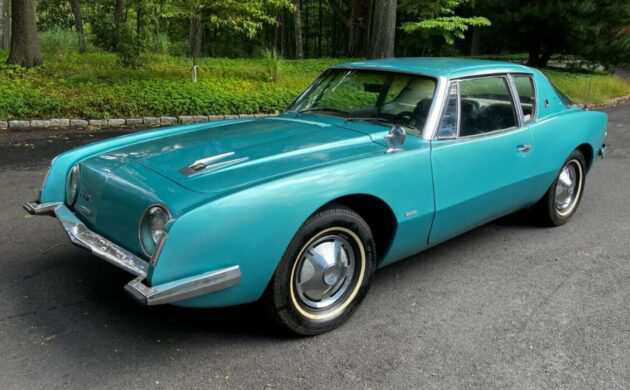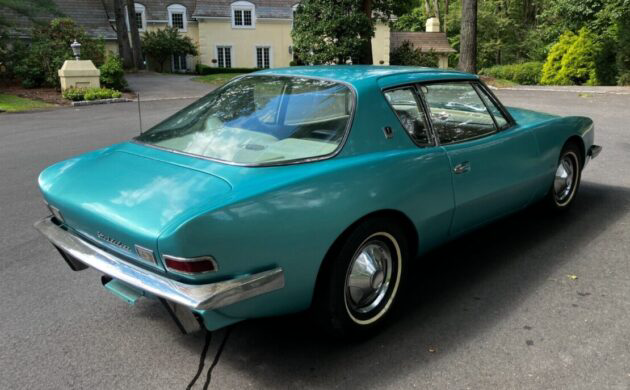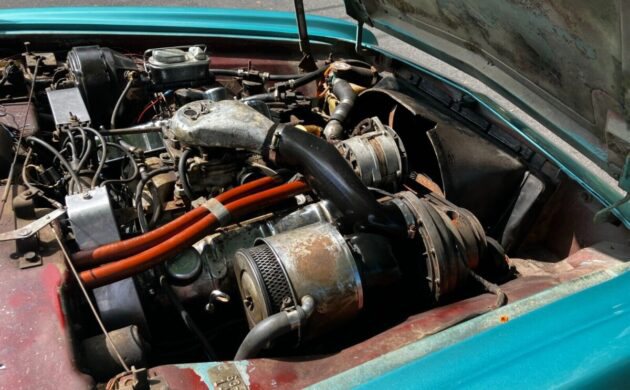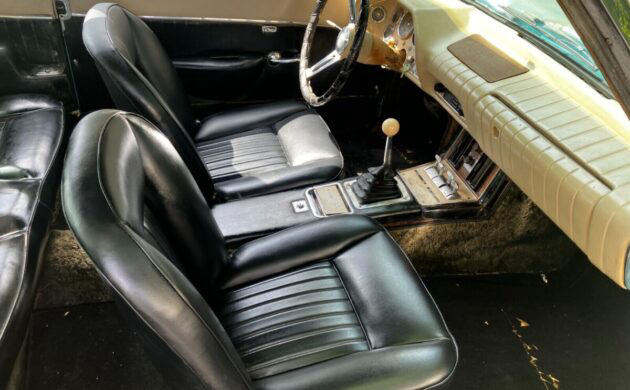When a vehicle manufacturer is teetering on the brink of financial oblivion, the most sensible approach is introducing a model designed to sell in high numbers with a reasonable profit margin to improve the bottom line. A less conventional strategy is to release a “halo” vehicle hoping to entice potential buyers into showrooms. Studebaker selected the second option, and to say it didn’t work would be a major understatement. The Avanti proved to be a case of “too little, too late.” Still, the concept attracted enough admirers for production to continue via several companies for decades after Studebaker was consigned to a distant memory. This 1963 Avanti R2 is a tidy classic, but it is a mystery machine. It needs a new home, with its owner listing it here on eBay in Franklin Lakes, New Jersey. They set their auction to open at $24,950 but have received no bids. They also provide a BIN option of $29,500 for those wishing to bypass the auction process. I must say a big thank you to Barn Finder Larry D, who has used a finely-tuned classic radar to spot this Avanti.
When the Avanti broke cover, it received mixed press reviews. Some praised its design and engineering, although others found its distinctive appearance too unusual. It is undoubtedly striking, and there’s little chance you will mistake an Avanti for any other vehicle from that era. The company offered potential buyers six paint shades for 1963, with this car’s owner selecting the imaginatively named Avanti Turquoise. The seller is candid about its condition, revealing evidence of a previous repaint. That brings us to a mystery with this classic, which reveals itself in the engine bay photo. Every Studebaker Avanti I’ve seen has its engine bay wearing the same shade as the exterior, although I have seen a couple finished in Black. This one wears Avanti Red, suggesting it may have undergone an earlier color change before a previous owner applied the current paint. The seller holds the original Build Sheet and other documentation that confirms the Turquoise factory color, meaning its history may provide some fascinating detective work for the buyer. The fiberglass panels present well, with no cracks or other nasty problems. The seller indicates one “hog trough” has a rust hole, and while patching may be an option, spending $900 on a replacement should ensure the car is structurally sound. That figure may seem significant, but it’s cheap insurance to prevent the vehicle from collapsing in an accident. The exterior trim looks excellent, as does the glass.
This shot had me contemplating this Avanti’s history and whether it has undergone a couple of color changes. I initially thought the Red might be an undercoat, but its shine in some spots reveals it is Avanti Red. If a buyer had the funds, the premium choice was the Avanti R2 with a four-speed manual transmission. That is what this car’s original owner selected, adding a 4.55 Twin Traction rear end that a subsequent owner changed to a 3.31. That should allow this classic to apply its 290hp to the road effectively. As a genuine Grand Tourer, the Avanti offered class-leading performance. It could storm the ¼ mile in 15.8 seconds before winding its way to 135mph. The seller indicates it is a numbers-matching classic that runs and drives extremely well. The only mechanical fault they note is the brake booster requires a rebuild. However, this doesn’t prevent the brakes from working as they should. They hold significant documentation for the new owner, including the desirable original Build Sheet.
The mystery with this Avanti continues when we examine its interior, and the non-original carpet raises questions. Studebaker offered three interior trim packages that combined Fawn and Black upholstery, each differentiated by a different carpet color. This car’s carpet isn’t original, and it isn’t a faithful replica of any offered by the company. Considering the exterior paint shade, I expect it to feature Fawn/Black or Turquoise/Black carpet for Color Scheme No. 4 or 5. It isn’t the only shortcoming with this interior, with the headliner looking patchy. The gauge fascia has some chips and marks, and the gauge lenses are dirty and becoming cloudy. On a more positive note, the glove compartment retains its original vanity case with a functioning pop-up mirror. Non-original components include ice-cold aftermarket air conditioning and a Kenwood radio/cassette player.
Studebaker was on its financial knees by the time the final Avanti rolled off the line in December 1963. The Avanti experiment had not proved the company’s savior, and while it limped along gamely for a few years, Studebaker left the automotive industry on March 17th, 1966. Some individuals saw merit in the Avanti, with Studebaker selling the tools and rights to a dealer for production to resume sans the Studebaker name. The Avanti name and rights passed through a further four owners before the final car appeared in 2006. Rumors persist of a revival, but none have come to fruition. Today, spotless examples of the Avanti R2 achieve healthy sale prices. I found a recent listing on a different site indicating this Avanti sold less than a month ago for $15,250. That makes me wonder whether the seller had a non-paying buyer or if someone is flipping this classic. What do you think?







Yes, probably a flipper, but it is a free market. It’s worth what someone is willing to pay for it in other words. Seems like a lot of people think cars like this should cost no more than a bottle of scotch.
Two things about the Avanti that never grew on me was 1) the roof line. It’s 2” too tall and makes the car look dumb (kind of like the Datsun 280Z in the 2+2 configuration). And 2) the asymmetrical hood (scoop?)styling. I always liked the round headlamp treatment better.
There is a reason for the off center hood channel and ornament. Loewy was a fighter plane enthusiast, the channel/ornament replicate the gun sight. This is the same reason for the overhead toggle switches.
Still ugly.
It;s always interesting to have 2 of the same car featured on BF at the same time. It puts the condition of this one into perspective. Depending on where the black one ends up, this blue one is going to seem overpriced, and unlucky to sell at the seller’s price.
With no grill to speak of, it will be right in style with the electric cars, like Tesla, of the future – an early automobile had a horse’s head mounted on the front – early electrics still had an unnecessary grill big enough to cool a radiator.
What the Avanti does have is a back seat, for two, that is actually comfortable.
The Avanti was designed by the legendary Industrial designer Ray Loewy, who designed everything from Locomotives to the Coke Bottle. Trying a radical design was another stab at Modernization for Stude. The hog trough that Adam mentions was a huge problem , where moisture and road salt sat and rotted. Understand that they are a bear to fix. This baby with a 4 speed is tempting. Good luck and happy motoring!
Cheers
GPC
Love the 4sp. Avanti’s
And i thought they had some discreet helping hands in the
background from Pietro Frua or Zagato. This model could
have been well sold in Europe but like the Jensen
Interceptor its shape receives mixed opinions.
Both of its colours i dont like and bright red generally longer
exposed to uv-radiation – sitting outside – will fade.
Which carbs where fitted from factory on this?
I came ta C the (if) white upholstry. Two greats in the ’50s: tuquorise on white. This one would look wonderful. Not the case but FINE as reped here. I even like the 4dor models (frm S. Amer?)
Never knew the vanti hada ‘cool air’ system ! The ac housing looks oem… carb hat too? Must have been early or 1st w/that. Wonder if their supercharger influenced (or reverse) that?
This is indeed the same car that supposedly sold for $15,250 less than a month ago, and now it’s being offered by the same seller, so I guess that other deal didn’t happen. Must be pretty rough because that would’ve been a great price….
Personally, I’ve always liked the Avanti. They never fail to grab my attention when I see one; a man in nearby Salina has a blue II-version made in 1970, which looks almost exactly like the ’64 model save for what mandatory differences had to be applied by ’70. People never think much of the Avanti, which is a shame because it is a true pony-car, one that predates the commonly-perceived “first” pony-car by a year and a half. Studebaker needs the actual historical credit for pioneering the pony-car concept that Mustangs and Camaros incorrectly get credited for.
These cars and Ramblers are in same chassis? Both have weird rear axle look.